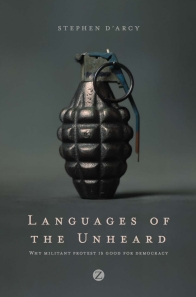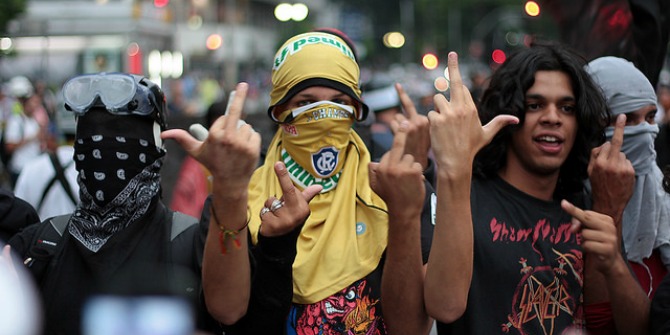Since 2011 swathes of protest, rebellion, and rioting have covered the globe. Challenging us to consider arson attacks against empty buildings, Black Bloc streetfighting tactics and industrial sabotage, amongst an array of other militant action, Stephen D’Arcy aims to show a crucial contrast between democratic and undemocratic action, rather than violence and non-violence. Carl J. Griffin is looking forward to using parts of the text with his undergraduate students to question the meanings and workings of democracy in the 21st century, and understand the role of militant action in revivifying public voices against vested and entrenched interests.
This review was originally published on the LSE Review of Books.
 Languages of the Unheard: Why Militant Protest is Good for Democracy. Stephen D’Arcy. Zed Books. March 2014.
Languages of the Unheard: Why Militant Protest is Good for Democracy. Stephen D’Arcy. Zed Books. March 2014.
To Martin Luther King, riots represented marginalised peoples attempting to be heard: the ‘language of the unheard’, the voice of repressed. Starting from this premise, Stephen D’Arcy’s wide-ranging book explores the ways in which several forms of ‘confrontational protest and rebellion’ can be understood as not only the amplifying of the unheard but also as civically admirable in so doing. Militancy, in certain contexts, is good, even desirable. The theory – or rather value position – that underpins D’Arcy’s argument is that in deciding what is useful and acceptable against that which is unhelpful and inexcusable is the ‘democratic standard’.
In short, this is understood to be the desirability of the self-governance of the people through ‘inclusive, reason-guided public discussion’, against which politicians and corporations will often brazenly ride roughshod over public will and discussion and thereby open a space for militant action. This established, the book is divided into two parts: the first exploring the ways in which militancy can be a critical aid to civic life and, more broadly, democracy, and objects therein; the second exploring ‘applications’, six sets of practices and militant techniques and asking whether such applications are (or are not) useful in advancing the democratic standard. In so doing, the reader is exposed to a diverse and highly appropriate set of examples of militant action, most drawn from recent north American cases but also showing a keen historical eye in thinking through contexts and foundations. D’Arcy, an activist himself, knows his protests.
Before considering in detail these examples, it is worth asking precisely what the point of this line of enquiry is. For beyond the simplicity and elegance of this structure, it is not clear, at least to this reviewer, precisely what the author wishes to achieve and for whom. While there is nothing wrong per se in questioning the philosophical, political, and practical worth of particular forms of militant action, there has to be a purpose in mind. But it is unclear as to whether this is a handbook for activists, a scholarly tome, or both. If the former, then many activists will feel uncomfortable with the academic absolutist tone and the exercise in delimiting legitimacy. Moreover, the use of analysis in the footnotes and, at times, excessively complex turns of phrase will be off putting. If it is the latter, then the lack of a conclusion and the strong sense of moral relativism might jar for many social scientists.

In many ways the first part of the book is the most satisfying and successful. Here D’Arcy is on strong ground, as we would expect from a moral and political philosopher. At once detailed, knowing, and provocative, the ideas detailed in the first three chapters add much to the activist (and activist’s) canon. While the style adopted here is arguably at times too reliant on rhetoric, the implications of D’Arcy’s logic are impeccable and the moral force of his claims compelling. One could perhaps question the uncritical use of the idea of the public/publics, and a little more on the counter-logic of conservative social movements against the progressive ideals argued for would have added balance and thus increase the argument’s force.
The second section will be more immediate to many readers not versed in political theory, and, as noted, the many examples used are persuasive. The problem is that the cases of militant protest are detailed, the contention having been set up at the beginning of the chapter, rather than analysed; the reader oft being left to decide whether the case meets D’Arcy’s ideal model. For example, in thinking through the technique of sabotage we are told how it works and what criticisms of it have been made, but the case for ‘application’ is never actually made. By way of contrast, the chapter on the Black Bloc – a tactic for protests and marches where individuals wear black clothing, scarves, sunglasses, ski masks, motorcycle helmets with padding, or other face-concealing and face-protecting items – is much more systematic in applying the standards set out in chapters one to three. Still, these are slight criticisms and do little to take away from the suggestive power of D’Arcy’s overall framing.
A greater concern is that for a book about voices and language there is very little about the language and discourse of protest. Thus while it is important to remember that D’Arcy’s analysis is concerned with militant protest, the examples used in chapters four to nine are always ‘overt’, always acts in the open rather than, after James Scott, ‘hidden transcripts’. Perhaps this is of little consequence in the wider aims of the book, but considering the emphasis in the title on vocality and text, and the critical ways in which discursive claims underpin all acts in the open, this has to be understood as a major omission and flaw. Indeed, the analysis offered in section two would have been deepened if set within a consideration of the importance of voice and language.
So what of Languages of the Unheard in the round? As a provocative read, and as a careful and deftly handled analysis of several recently prominent activist forms, the book is a welcome addition. I am particularly looking forward to using parts of the text with my undergraduate students to question the meanings and workings of democracy in the 21st century and understand the role of militant action in revivifying public voices against vested and entrenched interests. Think of this as a provocation, as an introduction, even as a tool, not something offering a full and comprehensive analysis or as an activist’s guide and manual. Beyond this, it is an enjoyable and lively read, and for stimulating debate and new ways of thinking it is a most welcome addition to the field.
———————————————
Carl J. Griffin is a senior lecturer in human geography at the University of Sussex. His research focuses on the geographies of popular protest and resistance in eighteenth- and early nineteenth-century Britain and Ireland. Among his recent publications are The Rural War: Captain Swing and the Politics of Protest (Manchester University Press, 2012) and Protest, Politics and Work in Rural England, 1700-1850 (Palgrave, 2014). While focused on the long eighteenth century, his research draws upon social movement theory and wider work on protest and resistance in the social sciences. This approach also informs his teaching, not least his popular module on the geographies of social movements and social conflict. Read more reviews by Carl.





